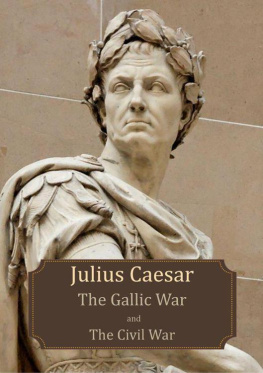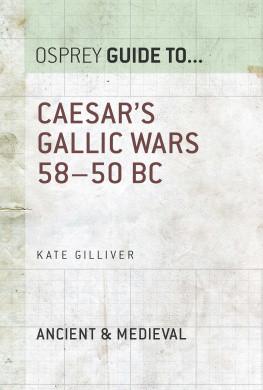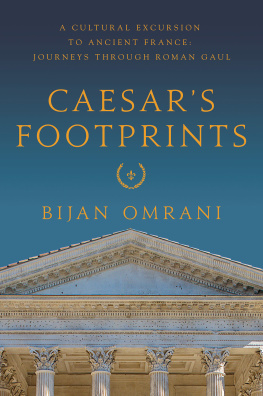G aul, taken as a whole, is divided into three parts, one of which is inhabited by the Belgae, another by the Aquitani, and the third by a people who call themselves Celts and whom we call Gauls. These peoples differ from one another in language, institutions, and laws. The Gauls are separated from the Aquitani by the river Garonne, from the Belgae by the Marne and the Seine. Of all these peoples the bravest are the Belgae; for they are furthest removed from the civilization and refinement of the Province, traders very rarely visit them with the wares which tend to produce moral enervation, and they are nearest to the Germans, who dwell on the further side of the Rhine, and are constantly at war with them. For the same reason the Helvetii also are braver than the other Gauls; they are fighting almost daily with the Germans, either trying to keep them out of their own country or making raids into theirs. That part of the whole country which, as we have said, is occupied by the Gauls, begins at the river Rhone, and is bounded by the Garonne, the Ocean, and the country of the Belgae. It extends, moreover, in the region occupied by the Sequani and the Helvetii, to the Rhine; and its trend is towards the north. The territory of the Belgae, commencing from the most distant frontier of Gaul, extends to the lower Rhine, and has a northerly and easterly aspect. Aquitania extends from the Garonne to the Pyrenees and that part of the Ocean which is off the coast of Spain; and its outlook is towards the north-west.
Pre-eminent among the Helvetii in rank and wealth was Orgetorix. In the consulship of Marcus Messala and Marcus Piso he organized a conspiracy among the nobles in the hope of making himself king, and persuaded the community to undertake a national emigration, as, being the most warlike of all the Gallic peoples, they could easily achieve dominion over the whole of Gaul. He had no difficulty in convincing them, because their country is limited everywhere by natural features, on one side by the Rhine, a broad deep river, which separates the Helvetian territory from the Germans; on another by the lofty range of the Jura, between the Helvetii and the Sequani; on a third by the Lake of Geneva and the Rhone, which separates our Province from the Helvetii. These Hermits restricted their movements and made it comparatively difficult for them to attack their neighbors; and, being a warlike people, they chafed under this restraint. Moreover, considering their numbers and their renown as valiant warriors, they felt that their territories only two hundred and forty miles long by one hundred and eighty broadwere too small.
Impelled by these motives and swayed by Orgetorix, they determined to emigrate into Gaul: buying up all the draught cattle and wagons that they could obtain, bringing all available lands under cultivation, with the object of securing an abundance of grain for the journey, and establishing relations of peace and amity with the neighboring tribes. They believed that two years would be sufficient to complete these preparations, and passed an enactment fixing their departure for the third year. Orgetorix was chosen as leader, and undertook a mission to the several tribes. In the course of his tour he persuaded a Sequanian named Casticus, whose father, Catamantaloedes, had for many years held sovereignty over the Sequani, and had been honored by the Roman Senate with the title of Friend, to seize the royal power, which his father had held before him, over his own tribe; he also persuaded Dumnorix, an Aeduan, brother of Diviciacus, who at that time held the principal power in his own country, and was very popular with the masses, to make a similar attempt, and gave him his daughter in marriage. He convinced them that it would be quite easy to achieve their purpose, as he was going to seize sovereignty over his own tribe; the Helvetii were undoubtedly the strongest people in the whole of Gaul; and he affirmed that by his wealth and his armed force he would secure them the possession of their thrones. Enthralled by his eloquence, they swore mutual fidelity; and they hoped that, once they had secured their thrones, they would be able, backed by three powerful and stable peoples, to make themselves masters of the whole of Gaul.
The scheme was made known to the Helvetii by informers. In accordance with national Helvetian custom, they insisted that Orgetorix should plead suicide. If he were condemned, his inevitable punishment would be death at the stake. On the day fixed for the pleading he made all his slaves from all parts, numbering ten thousand, come to the trial, and marched thither at the head of all his retainers and debtors, who were very numerous. With their protection he escaped trial. Exasperated at this defiance, the community endeavored to assert their rights by force, and the authorities summoned a posse from the districts, when Orgetorix died; and there is some reason to suspect (so the Helvetii believe) that he died by his own hand.
After his death the Helvetii in no way relaxed their efforts to carry out their intended emigration. As soon as they believed themselves ready for the enterprise, they set fire to all their strongholds, of which there were twelve, their villages, numbering four hundred, and the remaining buildings, which belonged to individuals; and burned the whole of their grain, except what they were going to take with them, that they might have no hope of returning home, and so be more ready to face every danger. Every man was directed to take a supply of flour from his house for three months for his own use. They induced their neighbors, the Rauraci, the Tulingi and the Latobrigi, to join their enterprise, burn their strongholds and villages, and emigrate along with them; at the same time they formed a close alliance with the Boii, who had formerly dwelt on the further bank of the Rhine, and had migrated into Noricum and taken Noreia.
There were only two routes by which it was possible for them to leave their country. One, a march leading through the country of the Sequani, passing between the Jura and the Rhone, was so narrow and difficult that carts could barely pass along it one at a time, while a lofty mountain overhung it, so that a handful of men could easily stop them; the other, leading through our Province, is much easier and more convenient, for the Rhone, which flows between the country of the Helvetii and that of the Allobroges, who had recently been subdued, is, at certain points, fordable. Geneva, the most remote town belonging to the Allobroges, is connected by a bridge with the country of the Helvetii, to which it is quite close. The Helvetii believed that they could either induce the Allobroges to let them pass through their country, as they were not yet apparently well disposed towards the Romans, or could compel them to do so. When everything was ready for their departure, they fixed March 28 in the consulship of Lucius Piso and Aulus Gabinius, for the general muster on the banks of the Rhone.












